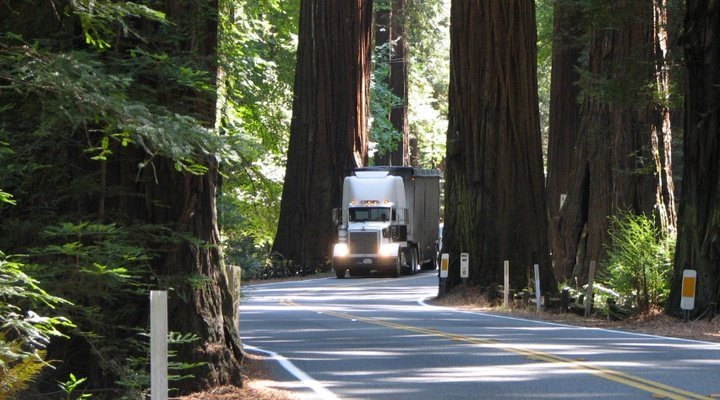
File photo: Caltrans.
PREVIOUSLY:
###
Last month a federal court ordered Caltrans back to the drawing board over its decade-in-the-planning Richardson Grove Improvement Project; earlier this month, a local judge did the more or less the same.
On June 5, after hearing a challenge brought by the Environmental Protection Information Center and the Center for Biological Diversity, Judge Kelly Neel of the Humboldt County Superior Court ruled that Caltrans’ handling of the project’s environmental documentation was faulty.
The issue was a technical one, arguably, and stemmed from an earlier Superior Court ruling. Back in 2014, the court ruled that Caltrans’ environmental impact report (EIR) on the project was inadequate because it didn’t take into account potential impacts of construction on the roots of nearby old-growth redwoods. Caltrans ended up commissioning a study about this from and arborist, tacked it onto the EIR and called the document finished.
But the environmental groups argued, and last week Neel agreed, that the root study should have prompted a whole new EIR that would then go out to the public and relevant regulatory agencies for comment and critique. While Neel said that she “did not believe this was done in bad faith,” the California Environmental Quality Act nevertheless compelled her to issue an injunction on the project until Caltrans goes back to the public.
The Richardson Grove Improvement Project would reroute just over a mile of Highway 101 through Richardson Grove, near the Humboldt County/Mendocino County line, in such a way that shipping industry-standard trucks could reach Humboldt County from the south.
Press release from the Environmental Protection Information Center:
Humboldt County Superior Court Judge Kelly Neel ruled in favor of environmental plaintiffs in the latest salvo in the nearly decade-long effort to prevent the widening of Highway 101 through old-growth redwoods at Richardson Grove State Park. As a result of this court decision, Caltrans is not allowed to physically alter the proposed project area and that the agency would need to get court approval before moving forward.
Plaintiffs include the Environmental Protection Information Center, Center for Biological Diversity, Californians for Alternatives to Toxics, Friends of Del Norte and four private citizens, Bess Bair, Trisha Lee Lotus, Jeffrey Hedin, and David Spreen. Plaintiffs Bair and Lotus both have generational family ties to the creation of the Park.
In her decision, Judge Neel found that Caltrans avoided public scrutiny by failing to solicit public comment on a significant piece of new information—a report from an arborist hired by Caltrans. In doing so, Judge Neel highlighted that the public and other agencies were deprived of their right to provide comment and feedback, something “essential” to the law.
“Caltrans has continued to view public opinion and opposition to the Richardson Grove Project as something that they can bulldoze through,” said Tom Wheeler, Executive Director at the Environmental Protection Information Center. “Four times, courts have returned the project to the agency, finding that their slapdash work violates the law.”
Peter Galvin, Co-Founder of the Center for Biological Diversity stated, “We urge Caltrans to finally abandon their deeply misguided and destructive plan to widen Highway 101 through Richardson Grove State Park. Our ancient redwood trees are too important to pave over.”
In 2010, Caltrans issued its Final Environmental Impact Report for the Richardson Grove Operational Improvement Project. In 2014, the First District Court of Appeals found that Caltrans had violated CEQA by failing to take a hard look at the project’s impacts to old-growth redwoods. After this decision, Caltrans attempted to cure its deficiency by hiring an arborist to examine project impacts. The arborist’s report, which presented new scientific data, including an untested rating system to predict impacts to tree health from project activities, was shielded from public comment through its release as part of an “Addendum” to the original CEQA documents. This added significant new information to the EIR without providing public notice and consultation with agencies.
The Court stated that “the rating system devised by the arborist may or may not rest on sound scientific footing. Without review and critique by others with expertise in the relevant fields, this footing remains untested. Peer review is essential to sound science.”
Plaintiffs are represented by Sharon Duggan, Stuart Gross of Gross & Klein LLP, Philip Gregory of Gregory Law Group, and Camilo Artiga Purcell of Artiga-Purcell Law Office.
###
DOCUMENT:
“Ruling and order on petition for writ of mandate and injunctive relief,” Bair v. California Department of Transportation, Humboldt County Superior Court. June 5, 2019.
###
EVEN MORE PREVIOUSLY:
- Caltrans’ Richardson Grove Project is Looking Pretty Dead. Enter the FBI!
- Caltrans Ordered to Redo Richardson Grove Environmental Documentation
- Decision in Richardson Grove Case
- EPIC Claims Victory in Latest Richardson Grove Ruling
- EPIC: Richardson Grove Realignment Project “Not Active At All” Anymore
- Caltrans: Richardson Grove Realignment Project Still Going Forward
- Judge Denies Environmental Groups’ Request for Attorney Fees in Richardson
- Caltrans Relaunches Richardson Grove Project; Agency Issues New Environmental Documentation For Controversial Highway 101 Realignment at the South End of the County
- As Expected, EPIC and Others Launch New Lawsuit Against Caltrans’ Richardson Grove Improvement Project
- Here We Go Again: Fifth Lawsuit Filed Against Caltrans’ Richardson Grove Project
CLICK TO MANAGE